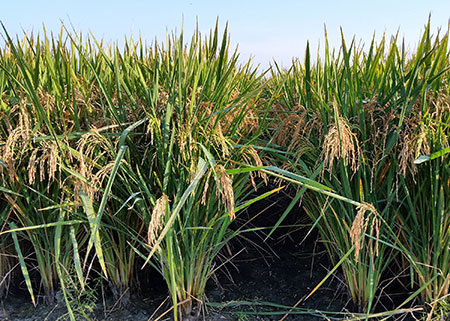News
The information presented on this page may be outdated. It may refer to situations which have changed or people who are no longer affiliated with the university. It is archived as part of Mississippi State University's history.
New rice variety serves niche for Mississippi rice growers

Nearly half of all rice produced in the U.S. is exported, so Mississippi farmers need rice variety options to ensure strong foreign demand for their harvests. (Photo By: Ed Redona)
6/15/2016
By: Vanessa Beeson
In 2015, Mississippi growers harvested nearly 150,000 acres of rice across more than 250 farms. The crop had a production value of $132 million.
Every few years, scientists in Mississippi State University's Mississippi Agricultural and Forestry Experiment Station, or MAFES, release a new rice variety to help growers meet global demand for the crop. Researchers recently developed a new variety with excellent milling qualities.
Wes Burger, MAFES associate director, said this latest variety, called "Thad," named after U.S. Senator Thad Cochran, gives growers one more option to sell in the international rice market.
"The MAFES rice breeding program seeks to meet the needs of Mississippi rice growers by developing new and improved varieties that are locally adapted for Mississippi's production systems, climate and soils," Burger said. "Our breeding program is focused on developing new varieties of rice that have high yield and consumer-preferred grain quality."
Different markets have different preferences when it comes to grain quality.
Burger said Thad is a conventional variety that produces yields comparable to Rex, the last conventional rice variety Experiment Station scientists developed. Rex has a medium level of amylose, a primary component of starch that is one of the most important factors in determining the eating quality of rice. Thad is high in amylose.
The sticky rice popular in Asian markets is a low-amylose grain, while high-amylose rice is loose and fluffy when cooked. High-amylose rice is popular in Latin American markets and is used to make the parboiled products common in the U.S.
Ed Redoña, MAFES professor at the Delta Research and Extension Center in Stoneville, Mississippi, said Thad is a high-yield alternative to the high-amylose rice varieties currently available. Thad might be a better alternative for the state's growers, he said.
"In our MAFES Official Variety Trials, the current most popular high-amylose conventional variety yielded 190 to 200 bushels per acre," Redoña said. "Thad yielded between 235 and 240 bushels per acre. It's going to be a good substitute for our producers who are marketing to that parboiled, loose rice market."
He said the MAFES rice breeding program had success with the Rex variety released in 2010.
"Rex, a conventional, medium-amylose, high-yield rice variety, has been readily adopted by our producers," Redoña said. "Within three years after its release, it captured approximately 20 percent of total rice acreage in the state."
Redoña explained that growers consider many factors when deciding which breed and variety of rice to plant.
"Growers make a varietal selection that fits their production system and market," he said. "They may select a conventional variety, a Clearfield variety or a hybrid. Clearfield varieties, licensed through BASF, are non-genetically modified, herbicide-tolerant rice. This type of rice is planted in fields prone to red rice, a common weed that encroaches on rice paddies."
Thad's Clearfield counterpart, CL163, was commercialized by HorizonAg on a limited scale in 2016. The MAFES rice breeding program in Stoneville also developed CL163.
MSU submitted a plant variety protection application for Thad to the U.S. Plant Variety Protection Office. During the 2015 growing season, MAFES began production of foundation seed at the R. R. Foil Plant Science Research Center in Starkville. Limited quantities of Thad foundation seed were made available to certified seed growers during spring 2016. The 2017 growing season will be the first year that Thad will be commercially available for purchase as certified seed.
The MAFES rice breeding program is made possible through long-term funding from the Mississippi Rice Promotion Board. For more information on MAFES, visit http://mafes.msstate.edu.
View More News